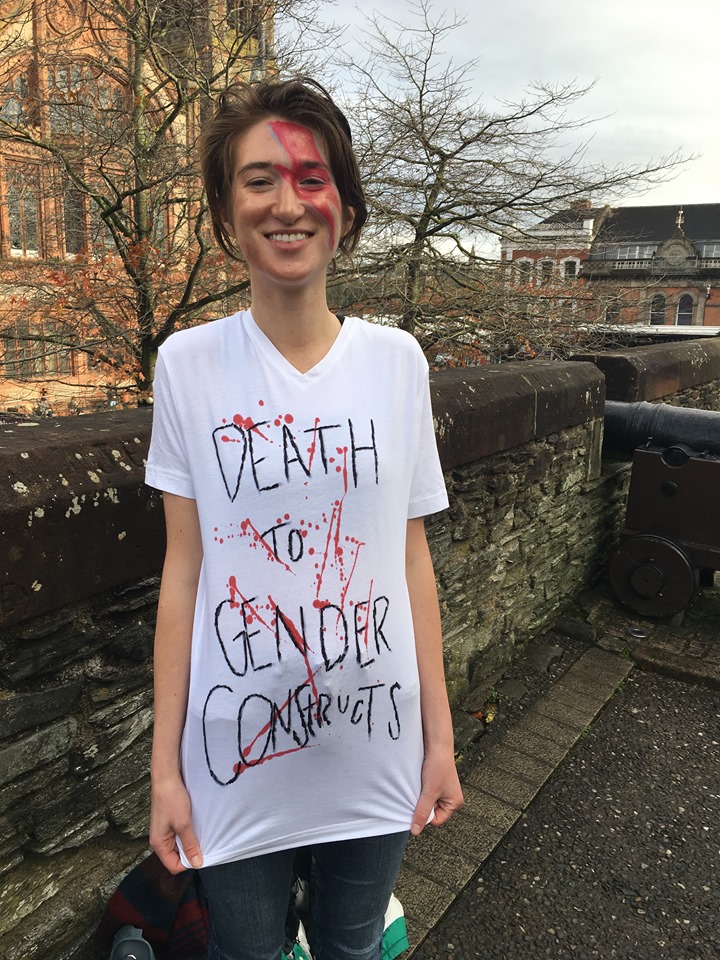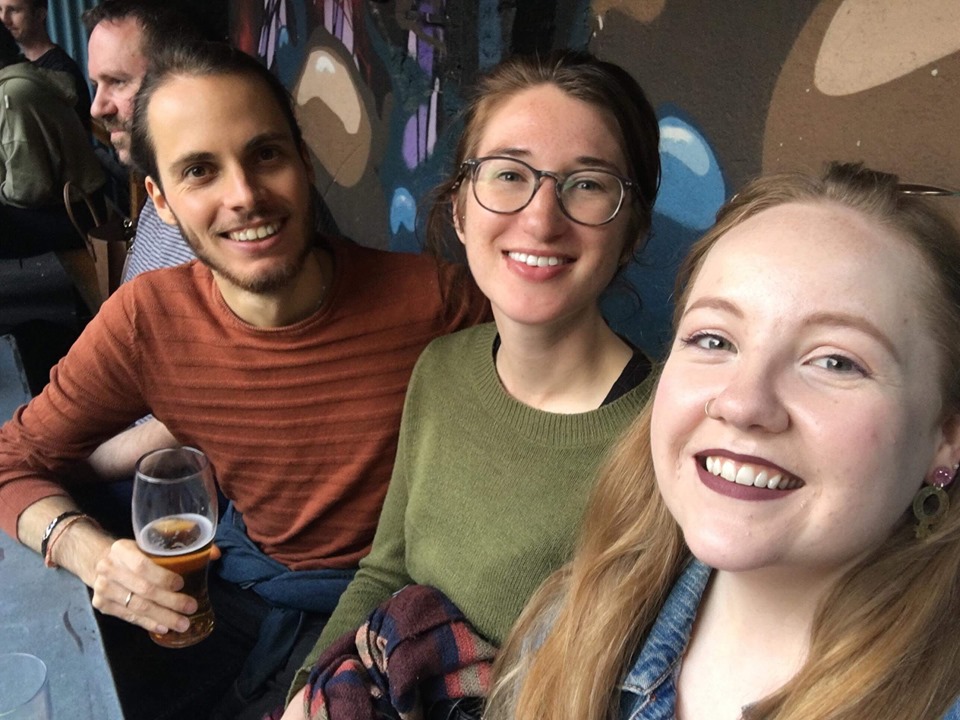In our Northern Roots series, we speak to readers originally from Northern Ireland but currently living elsewhere, or vice versa – or who’ve spent time away from NI. This week’s interviewee is Laney Lenox who is originally from Louisiana, USA, before moving to Belfast. You can follow Laney on Twitter @LenoxLaney.
1. Tell us about yourself. Where do you come from and when did you come to Northern Ireland? What brought you here? What do you do now?
I was born and raised in Shreveport, Louisiana. At 27, I can now definitively say that I spent a significant portion of my early-mid twenties on the island of Ireland. This began in 2013 with a study abroad semester in Belfast. At the time, I was undergoing a self-designed Peace Studies degree. During my second year of university, I was told that for conflict-studies focused programs abroad, I basically had three choices – the Balkans, South Africa, or Northern Ireland. My decision to spend six months in Northern Ireland had little more thought put into it than pulling a name out of a hat. I just thought that being in Ireland would make it easy to travel to some European hot spots (clearly, I didn’t have a firm or even a loose grasp on the location of the Balkans at the time). It was all so ill-informed and accidental – I suppose falling in love often is.
Leaving Belfast broke my heart as palpably as the end of a relationship. After that semester abroad, I returned to the US to complete my senior year. Shortly after graduating, at 22, I moved to Galway for a year on a working holiday visa. I started freelance writing, working at bars, and just generally experiencing ‘the real word’ I’d heard so much about. At 24, I began a masters course in Conflict Transformation and Social Justice at Queen’s University in Belfast, clocking another 18 months on the island. Then, this past September, I began my doctorate at Ulster University’s School of Applied Policy and Social Sciences. My project explores the role of archival practice in societies affected by conflict, particularly archives documenting the prison experience and including ex-prisoners in the memorialization process. I believe that better understanding these spaces can offer important insight regarding perceptions of time and conflict, as well as understanding how peace-building mechanisms can build more space for inclusivity.
2. What do you think of Northern Ireland? And how does it compare to where you are from?
Where I’m from, the American South, and Northern Ireland both share a difficult reputation with outsiders. With that, they also share dedicated people who really love the place and have stayed to strive (sometimes through blood, sweat, and tears) to struggle for a better future. I’ve been proud to witness this struggle in both places and to be part of it in whatever small way I can.
3. Are you hopeful for Northern Ireland’s future? Does Brexit have any impact on you and how you view the future?
I would say that I’m hopeful, but critically so. By this I mean an action-oriented hope devoid of any normalcy bias or any sort of ‘it will all work out in the end’ type sentiment. I think hope is a choice to live in profound vulnerability. Hoping means daring to imagine and actively work towards a better future. With this comes the acceptance that you may be disappointed, and this is a vulnerable position to place yourself. But this does not excuse refusal to work towards that imagined future.
I think Brexit has forced us all to accept a certain amount of uncertainty and challenged the notion of hope. But again, hope is a choice, and I think we all do well to remember that.

4. Do you think you will return home or do you plan to stay in Northern Ireland long-term? Is there anything that may influence your decision either way?
My multiple returns to this island indicate it does hold a special place in my heart and mind. However, I’ve always felt staying long term was largely out of my control because of visa and immigration restrictions. I would certainly stay here if the right opportunity came along. If any EU or UK passport holder falls in love with me after reading this and wants to get married, get in touch.
5. What can Northern Ireland learn from your home country?
Speaking as someone from Louisiana—embrace spicier foods!
6. If Northern Ireland had a president with sweeping powers, and it was you, what would you do?
Get rid of the idea that one person could have sweeping powers and establish a properly participatory democracy. And abolish prisons.
7. What would you like to see more of on Northern Slant?
I love that Northern Slant creates space for personal-perspective driven pieces, such as this series. This is what I’d like to see more of – pieces connecting the personal lives of the writers to broader societal issues. This helps encourage conversation, build understanding, and is based on an important and oft-repeated phrase – the personal is political, and vice versa.

8. If you could ask three politicians (one from Northern Ireland) out to dinner, who would they be and why?
Do former politicians count? If so, Bernadette Devlin McAliskey and Monica McWilliams because of their steadfast commitment to their causes, and because I love strong, assertive women. Gerry Adams just because I’m curious to see what he’s like in person, and I have a few burning questions about that Twitter account.
9. Do you have a favourite quote or mantra?
My favourite writer, Joan Didion, has a quote I loved years before I ever set foot in Belfast. It holds profound insight for this place, particularly in reference to my own facet of peace-building work, dealing with contentious pasts:
“I think we are well advised to keep on nodding terms with the people we used to be, whether we find them attractive company or not. Otherwise they turn up unannounced and surprise us, come hammering on the mind’s door at 4am of a bad night and demand to know who deserted them, who betrayed them, who is going to make amends.”
Revisiting, or spending time thinking about the past, is often framed in terms of dwelling and refusing to move forward. However, I think inclusive progress demands reflexivity. Otherwise, we move towards the future bound by the same harmful structures of our past. I mean this both as societies collectively and as individuals. Personal and societal growth comes from examining patterns and deciding what we want to hold onto, and what we want to, and ought to, leave behind. Otherwise, we remain trapped in old patters and ways-of-being. Also, reflexivity allows for the inclusion of more diverse perspectives moving into the future. Again, the personal is political, and vice versa.
10. What’s your message for people back home?
When you visit Belfast, or anywhere for that matter, really try and embrace complexity. Remember that your own knowledge, just like everyone else’s, comes from a certain standpoint and is full of assumptions. Remember this especially when visiting the peace walls or on any conflict-related tour. I’ve seen a lot of things written on the Falls/Shankill peace line that say something like “The journey to peace begins with a single step.” Just remember you are a visitor to a community, and it is not you having to take those steps.

